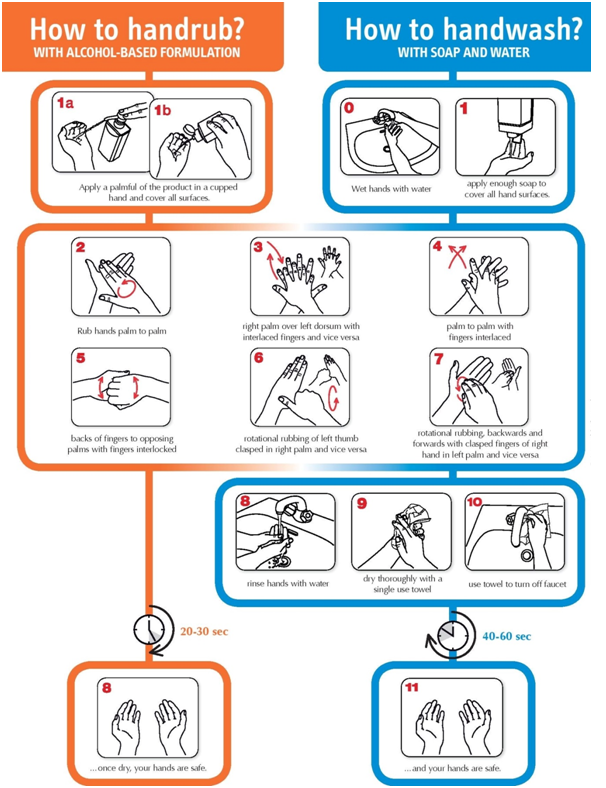“You can’t necessarily control what you touch. You can’t control who else touched it. But you can look after your own hands.”
Coronavirus (COVID-19) is a respiratory illness, meaning it is mostly spread through virus-laden droplets from coughs and sneezes. If you don’t catch your coughs and sneezes in a tissue and safely dispose it off the virus can end up on surfaces. If someone else touches that contaminated surface, the virus can transfer onto their hand. If you have the virus on your hands, you can infect yourself by touching your eyes, mouth or nose. Hence, “Hand Hygiene” remains the No. 1 tip for preventing the spread of Coronavirus (COVID-19).
Hand Hygiene is a general term referring to any action of hand cleansing.
HAND HYGIENE INCLUDES:
- Washing hands with the use of water and soap or a soap solution
OR
- Applying an alcohol-based handrub/ hand sanitizer to the surface of hands
When should I wash my hands?
In the context of COVID-19 prevention, you should make sure to wash your hands at the following times:
- After blowing your nose, coughing or sneezing
- After visiting a public space, including public transportation, markets and places of worship
- After touching surfaces outside the home, including money
- Before, during and after caring for a sick person
- Before and after eating
In general, you should always wash your hands at the following times:
- After using the toilet
- Before and after eating
- After handling garbage
- After touching animals and pets
- When your hands are visibly dirty
When should I use hand sanitizer?
Alcohol-based hand sanitizer (containing at least 60% alcohol) is helpful in protecting against the spread of germs and viruses.
Hand sanitizer is effective when soap and water are not available. This includes
- when taking public transportation and it’s difficult to get to a bathroom (airplane, train, bus).
- Carrying a travel size bottle of hand sanitizer makes it easy to disinfect your hands in these situations.
Can use it when you sit down to eat at a restaurant or in the presence of crowds (games, church service, school meetings).
Which is better: washing your hands with soap and water or using hand sanitizer?
In general, both hand washing with soap and water and hand sanitizer, when practiced/used correctly, are highly effective at killing most germs and pathogens. If your hands look dirty, you should wash them with soap and water. Hand sanitizer is less effective on visibly dirty hands. Hand sanitizer is often more convenient when you are outside the home.
Things to consider
- Using clean, running water is important. Never wash your hands by submerging them in a basin or bowl of standing water. This water could contain germs that continue to live there.
- Avoid touching doorknobs, toilet flush handles, and faucets after washing your hands. Try using a paper towel, the sleeve of your clothing, a scarf, or gloves to protect your hands and fingers against germs.
- Do not leave hand sanitizer unattended around small children. Drinking it is poisonous.

Dr. Divya Vaz